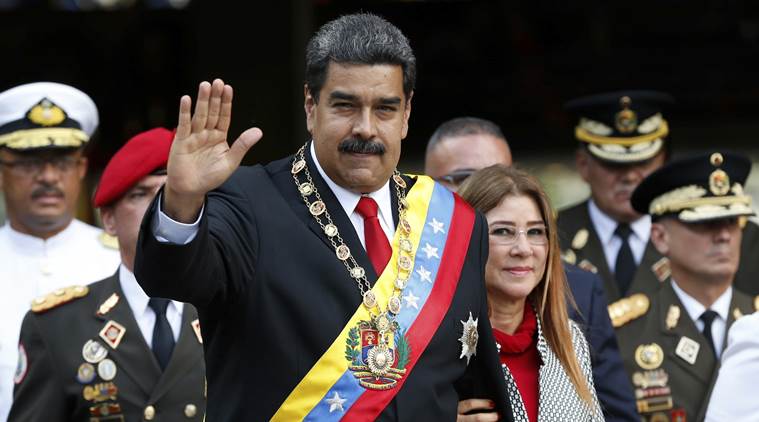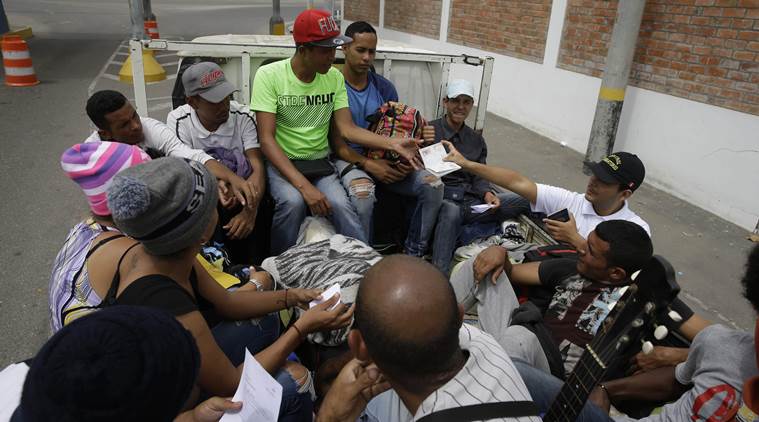 Many in Venezuela blame President Nicolas Maduro for the country’s spiralling economy.(AP Photo/Ariana Cubillos, File)
Many in Venezuela blame President Nicolas Maduro for the country’s spiralling economy.(AP Photo/Ariana Cubillos, File)
Venezuela, once a rich oil reserve country, is now battering an unprecedented economic crisis. Hyperinflation, mass migration, food shortage, increasing number of crimes and grinding poverty has pushed the nation into a deep turmoil. Many in Venezuela blame President Nicolas Maduro for the country’s current condition. Here is a look at the crisis unfolding in Venezuela and how it is affecting its people
What is the Venezuela crisis?
Hyperinflation is the biggest problem faced by Venezuela. The inflation rate there is expected to reach a stunning one million per cent this year, putting it on par with the crises of Zimbabwe in the 2000s and Germany in the 1920s, according to the International Monetary Fund. The government claims that the country is the victim of an “economic war” and that the major issues are due to opposition “plots” and American sanctions.
Hyperinflation in Venezuela
The plummeting oil prices since 2014 is one of the main reasons why Venezuela’s currency has weakened sharply. The country, which has rich oil reserves largely depended on it for its revenue. But when the oil price dropped drastically in 2014, Venezuela which received 96 per cent of its revenue from the oil exports, suffered a shortage of foreign currency. This made import of basic essentials like food and medicines difficult.
 A survey earlier this year reported that more than 60% surveyed said that they had woken up hungry because they did not have enough money to buy food (Reuters)
A survey earlier this year reported that more than 60% surveyed said that they had woken up hungry because they did not have enough money to buy food (Reuters)
Food and medicine shortage in Venezuela
Venezuela’s imports are down 50% from a year ago, according to Ecoanalitica, a national research firm, CNN reported. Venezuela’s minimum wage is now about the equivalent of $1 a month, making basics unaffordable for many. With a shortage of the import goods, the black market has got a free hand in the country. Prices have been doubling every 26 days on average, according to a report in BBC. According to an Al Jazeera report, many Venezuelans sift through the rubbish and bins in search for food.
A survey from February this year found that almost 90% of Venezuelans live in poverty and more than 60% surveyed said that they had woken up hungry because they did not have enough money to buy food, reported Reuters. Apart from food, the country is also facing medicine shortage. The economic crisis has also hit the public health system, making medicine and equipment inaccessible to its people.
New currency of Venezuela
Amid the growing crisis, the government issued new currency — with new clour notes and denomination — to keep up with the projected inflation. While earlier, Maduro had decided to remove three zeros from the bolivar currency, he later dropped off five zeros. The new currency will be released next month and overhaul would tie the bolivar to the recently launched state-backed cryptocurrency called the petro, Maduro said in a televised broadcast. The new “Bolivar Soberano” currency is worth 100,000 “old” Bolivares.
Cryptocurrency experts have said the petro suffers from a lack of credibility because of a lack of confidence in Maduro’s government and the mismanagement of the country’s existing national currency.
 A Peruvian immigration officer checks the passports of Venezuelan migrants near Tumbes, Peru (AP)
A Peruvian immigration officer checks the passports of Venezuelan migrants near Tumbes, Peru (AP)
Mass Migration
Angered by the economic crisis in the country, many Venezuelans have started leaving the country. Of the 2.3 million Venezuelans living abroad, more than 1.6 million have fled the country since the crisis began in 2015, according to the UN. The pace of departures has accelerated in recent days, sparking a warning from the UN. The majority have crossed into neighbouring Colombia and then to Ecuador, Peru and Chile. Others have gone south to Brazil.
The mass influx of people from Venezuela has triggered a strong response from Ecuador and Peru. According to news agency AFP, Colombia had criticised its two southern neighbours for implementing travel restrictions, warning it wouldn’t stop migration. Ecuador — where close to half a million people have fled this year alone — then lifted its week-long requirement for Venezuelans to produce a passport, all the while helping those migrants reach Peru. Peru’s citizens largely supported the move, though, worried about the impact that the 400,000 Venezuelans already in the country would have. In Brazil, rioters this month drove hundreds back over the border, reported Reuters.
 A man gets off the bridge as people queue to try to cross the Venezuela-Colombia border through Simon Bolivar international bridge in San Antonio del Tachira, Venezuela (Reuters)
A man gets off the bridge as people queue to try to cross the Venezuela-Colombia border through Simon Bolivar international bridge in San Antonio del Tachira, Venezuela (Reuters)
Colombia says it has already given temporary residence to 870,000 Venezuelans but it can barely cope. In Peru, record 5,100 people entered the country in a single day earlier this month. Colombia has pleaded with its southern neighbours to agree to a combined migration strategy, while Ecuador has called a meeting of 13 Latin American countries next month to discuss the crisis. UN Secretary-General Antonio Guterres will set up a special UN team to ensure a coordinated regional response.
Increasing crime rate in Venezuela
As the country slips into poverty, many are turning towards crime to make money. There were almost 27,000 violent deaths in the country last year, with Venezuela having the second highest murder rate in the world after El Salvador, according to the Venezuelan Observatory of Violence, a local crime monitoring group. Many Caracas residents refuse to go out at night due to security fears, and wealthier Venezuelans often travel in bullet-proof cars with bodyguards. A recent Gallup study placed Venezuela at the bottom of its 2018 Law and Order index, with 42 per cent of surveyed Venezuelans reporting they had been robbed the previous year and one-quarter saying they had been assaulted, reported Reuters
(With inputs from agencies)